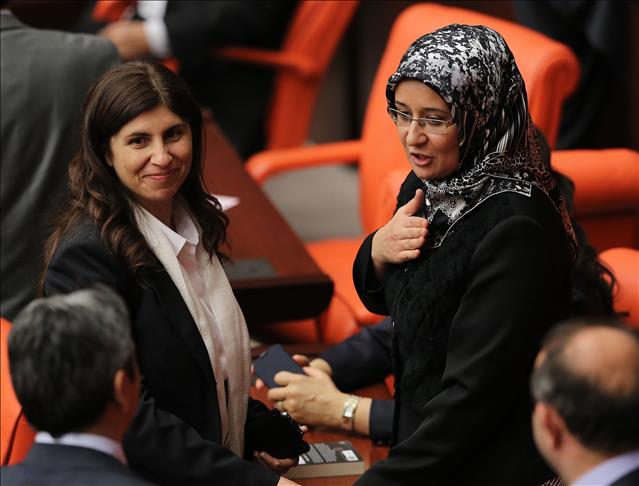
After AK Party MPs entered into parliament, the CHP's Parliament Group Deputy Chairman Muhammer Ince requested from the parliament speaker, Meral Aksener, that the development be discussed. Aksener decided to give a 15 minute recess to talk with the parties' parliament group leaders.
Following the recess, CHP's senior leader Ince made the first speech and criticized the AK Party's last 11 years of politics, instead of directly attacking the headscarf issue.
The Pro-Kurdish Peace and Democracy Party's Group Deputy Chairman Pervin Buldan referred to the headscarf issue as among the most important problems in Turkey and voiced her pleasure at seeing the problem solved. Buldan also appealed to men not to say anything over what women wear.
The Nationalist Movement Party (MHP) Deputy Secretary General Ruhsar Demirel said the day was "a normal day" as nothing extraordinary had happened in Turkey. Demirel said the headscarf was not a problem for Turkey.
AK Party MP Mihrimah Belma Satir said this is "the picture that Turkey has been waiting for." Satir said the development has ended a "rough period" as a result of the democratization process in Turkey.
Deputy Prime Minister Bulent Arinc took the floor to address the parliament in the behalf of the government. He praised reaction shown by parties, and added that "Those reactions are befitted to parliament. The parliament has shown a maturity. I thank all my friends."
The headscarf issue has been on the agenda of Turkish politics for more than three decades since it was banned in Turkish universities in 1984. Since then many attempts to abolish the ban on wearing headscarves in state institutions and universities have failed.
The surveillance on the headscarf in state institutions intensified particularly after the Turkish army had ousted the Welfare Party-led coalition government in 1997.
However, the spark of the headscarf issue was reignited in 1999 when Merve Kavakci entered the Parliament with a headscarf as the MP of the Virtue Party, the successor of the Welfare Party. She was then asked by late Prime Minister Bulent Ecevit to leave the Parliament and lost her seat in Parliament.
The ruling AK Party has placed the headscarf issue at the top of its agenda since its establishment and rose to power in 2002.
The AK Party's first attempt concerning the headscarf issue in 2008 sought to amend the related Turkish constitution article to surpass all regulations banning headscarf-wearing at universities. It was approved in Parliament with 411 out of 550 votes, but was canceled after being taken to the Constitutional Court by the main opposition party CHP and Democratic Left Party (DSP). A short while after the case, the Chief Public Prosecutor filed a closure case against the ruling AK Party, claiming it had acted against secularism.
In the 2010 referendum on the amendment of 26 articles of the Turkish constitution, the issue was referred to between the lines, rather than directly. Since then many universities allow students to enter campuses with headscarves, despite it being banned in state institutions.
The concluding attempt by the AK Party concerning the headscarf issue came with PM Recep Tayyip Erdogan's declaration on September 30 of the Democratization Package, which opened the gates of state institutions to women wearing headscarves. It also introduced a number of reforms regarding political rights, such as the election threshold, party organization, propaganda in non-Turkish languages, abolishment of the student oath, freedom of education in different languages and dialects at private schools, legal guarantee on personal data and deterrence for crimes of discrimination.
englishnews@aa.com.tr


